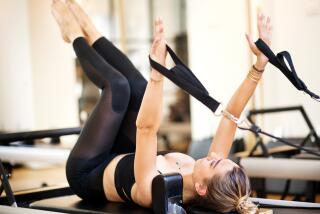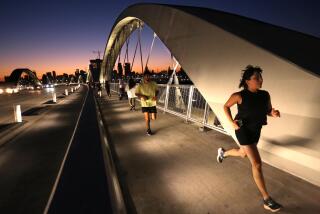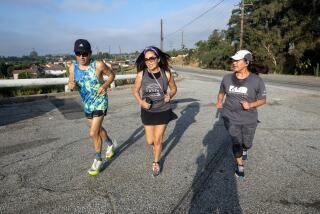Staying in Step With Fitness Game
Sticking with an exercise program tops many a New Year’s resolution list. But which exercise to choose? A well-known runner and a well-known walker talk about the advantages of each activity and why they persevere.
Running: Dr. George Sheehan, marathoner; medical editor of Runner’s World magazine; author, “Personal Best,” Rodale Press, 1989
“Runners and walkers are brothers and sisters under the skin. We just go at two different speeds. The real joy of running is being able to dissociate yourself from the activity. I take my mind for a run, not my body.
“People ask me why I started to run. The better question is, why do I continue to run? It’s the satisfaction I get from such indefinable things as peace and solitude. Sometimes I go out for a run and come back with a laundry list. Sometimes I come back with great ideas.
“There is a recently published book that says solitude is a natural environment for productivity and genius. Those benefits--plus the benefits of being fit, seeing yourself as an athlete and improving self-image--all accompany running. The main problem with beginning runners? They attack the activity too grimly and put too much effort into it. I had a friend who said she couldn’t run a half mile. We went together and ran two miles, and she said, ‘Well, I never go this slow.’
“The main thing is to be comfortable when you are running, no matter how slow the pace. Alf Shrubb, a distance runner at the turn of the century, once said the proper pace at which to run a marathon is one in which you can fall asleep.
“I run to think. Anything that interferes with that, be it a pain in the knee or something else, is bad.”
Walking: Ann Ward, walker and runner; assistant professor of medicine, University of Massachusetts Medical School; co-author, “The Complete Book of Fitness Walking,” Prentice-Hall, 1990.
“Walkers can derive many of the same benefits as runners. You can dissociate yourself from the activity, for instance. You can let your mind wander. Walking gives me time to think through a lot of issues. There’s a better flow to my day after I walk.
“Walking may be a good entree to an exercise program, especially for someone who has been inactive. You may want to start out walking and move into running. Some people, though, will never like to jog, no matter what speed. So walking . . . is a good alternative.
“Beginning walkers often don’t think walking is ‘real’ exercise or that they are benefitting from it. A lot of people feel, if they are not jogging, why bother?
“But walking is beneficial. There is a continuum of health-related benefits from walking, such as weight maintenance, weight loss, control of blood pressure and blood cholesterol levels.
“Even if you go out for a 10- or 15-minute walk a day, you are deriving health benefits from it. Walkers can achieve an aerobic training effect on the cardiovascular system.
“From an injury standpoint, walking is a much lower-impact activity than running. So there is less risk. But there is some risk. So if you walk, you are better off wearing walking shoes.
“And you should start off walking at a slower pace to warm up the muscles.”


